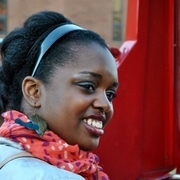
|
|
Why Does Advocacy Matter to You?This is the second of a two-part series that explores the importance of advocacy from the point-of-view of four aspiring arts administrators.
Did you know that Pennsylvania historically takes one of the largest delegations to Arts Advocacy Day each year? One of the reasons for this is due to the students who attend on behalf of Drexel University's Arts Administration program. We recently reached out to some of these aspiring arts administrators to find out why advocacy is important to them and why they are looking forward to Arts Advocacy Day 2014. Can't join these students in D.C. later this month? Join us on March 25th as we partner with a number of community organizations to offer our first ever Arts Advocacy Day Phone Bank at four locations throughout Greater Philadelphia! Kristal Pacific, Survey Assistant - Philadelphia Museum of Art
GS: Why are you participating in Arts Advocacy Day this year? Why do you feel advocating for arts and culture is so important? KP: I am participating because I think advocating for the arts and cultural sector of the U.S. is of the utmost importance for the cultural vibrancy of our country. Former Texas Congresswoman Barbara Jordan describes some of the benefits of the arts. She states: “The arts are not a frill. The arts are a response to our individuality and our nature, and help to shape our identity. What is there that can transcend deep differences and stubborn divisions? The arts. They have a wonderful universality. Art has the potential to unify. It can speak in many languages without a translator. The arts do not discriminate. The arts can lift us up.” I believe that the arts help to distinguish the U.S. as a leader in this global world, and I believe that the government needs to support the arts. I am very happy about the government decision to increase funding for the National Endowment of the Arts and I believe that this is a start in the right direction to fix some of the country's economic problems. In the arts and cultural sector, there are approximately 100,000 nonprofit organizations, creating about 2.2 million full-time jobs. No one wants to hear about more jobs being lost, so the increased funding of arts organizations will undoubtedly create more jobs. Arts and cultural organizations pay about 4.99 billion in state and local taxes and 5.26 billion in federal taxes. Cutting funding for the arts will have only created a deeper deficit, something the country should avoid. I think that participating in Arts Advocacy will allow me and many others to send a message to the government that we are a strong sector and one that cannot and should not be extinguished. GS: You’ve volunteered for GroundSwell in the past – why is the work of GroundSwell meaningful for you? KP: I really appreciate the work of Groundswell because I believe that their work is instrumental in making the Greater Philadelphia region a better place to live. I love that Groundswell promotes the idea that every person has the ability to "do something good for a change." I think that Groundswell makes people feel empowered and ensures that no deed is too small. GS: Other than GroundSwell, what kind of advocacy/volunteer efforts have you been a part of in the past? What kind of impact do you think it had on your immediate community/organization/the sector as a whole? KP: Other than Groundswell and being a member of the Arts Administration Graduate Association, I have not been a part of other advocacy efforts. This avenue is pretty new to me but I am certainly looking for more opportunities to get involved. GS: At Arts Advocacy Day, attendees are often told that personal stories often make the most impact when speaking with legislators. Do you have a personal story regarding arts and culture that you think would make an impression in your Arts Advocacy Day meetings? KP: I have been involved with and passionate about the arts, specifically music, for as long as I can remember. I grew up with a single mother, an immigrant from Trinidad (along with my sister), without a lot of money and in a troubled neighborhood in Brooklyn. I still remember the day that my mother asked me if I wanted to join the Brooklyn Youth Chorus Academy. I was six years old and she was working with New York Foundation of the Arts at the time. I said that I would love to join, I auditioned, I got in and I have been, what I call, a music maniac ever since. Being a part of a chorus has really determined the direction of my life. It has allowed me to see places I may not have otherwise seen and attain accomplishments that have surpassed my expectations. I now have musical experience that exceeds my years. For example, I am lucky enough to have had the opportunity to sing with Elton John, Barbra Streisand, the New York Philharmonic and many other notable artists in all genres of music. It is almost unbelievable to me that I sang a solo at Carnegie Hall and a trio at the United Nations before the age of 18. I have been blessed enough to be presented with opportunities that others can only dream of and I am forever grateful. With the chorus, I have traveled nationally and abroad to England, Wales and Austria. Through those experiences, I have realized the international appeal of the arts. I understand that the arts transcend many cultures and lands. I want to and will continue to be a part of the global arts community.
Josie Slavsky, Graduate Student - Drexel University's Arts Administration Program.
GS: Why are you participating in Arts Advocacy Day this year? Why do you feel advocating for arts and culture is so important? JS: Participating in Arts Advocacy Day is an amazing opportunity to engage with the arts community nationally and with our lawmakers. Advocating for the arts is so important because we live in a time where resources are spread between so many programs and the arts are often the last to be supported even though they have the ability to make a huge impact on our communities. GS: You’ve volunteered for GroundSwell in the past – why is the work of GroundSwell meaningful for you? JS: I was first introduced to GroundSwell last fall and I immediately knew that it was a program I wanted to be involved in. I have always been concerned with arts and culture through the lens of community development and GroundSwell does an amazing job of championing those things which I am most passionate about. GS: Other than GroundSwell, what kind of advocacy/volunteer efforts have you been a part of in the past? What kind of impact do you think it had on your immediate community/organization/the sector as a whole? JS: Having moved to Philadelphia just last fall I have had few opportunities to volunteer outside of GroundSwell, however throughout my life, growing up and attending college in Michigan, I have volunteered for a variety of community and arts organizations, many of which focused on community growth through the arts in Detroit and Lansing. GS: At Arts Advocacy Day, attendees are often told that personal stories often make the most impact when speaking with legislators. Do you have a personal story regarding arts and culture that you think would make an impression in your Arts Advocacy Day meetings? JS: One of the most meaningful arts experiences I have had was on a trip to Mali where I worked with local university students to educate third, fourth, and fifth graders at the Ciwara school using interactive teaching techniques and the arts to expand upon their education. It was one of the most meaningful experiences of my life and it was clear to me after a month of working with everyone, that the time we spent in the school and with the university students impacted the way the children not only felt about learning but also themselves and their self worth.
|
|
|
This is the second of a two-part series that explores the importance of advocacy from the point-of-view of four aspiring arts administrators. |
|
|
|
The work of the Greater Philadelphia Cultural Alliance is made possible through the generous support of committed individuals and institutions. |




